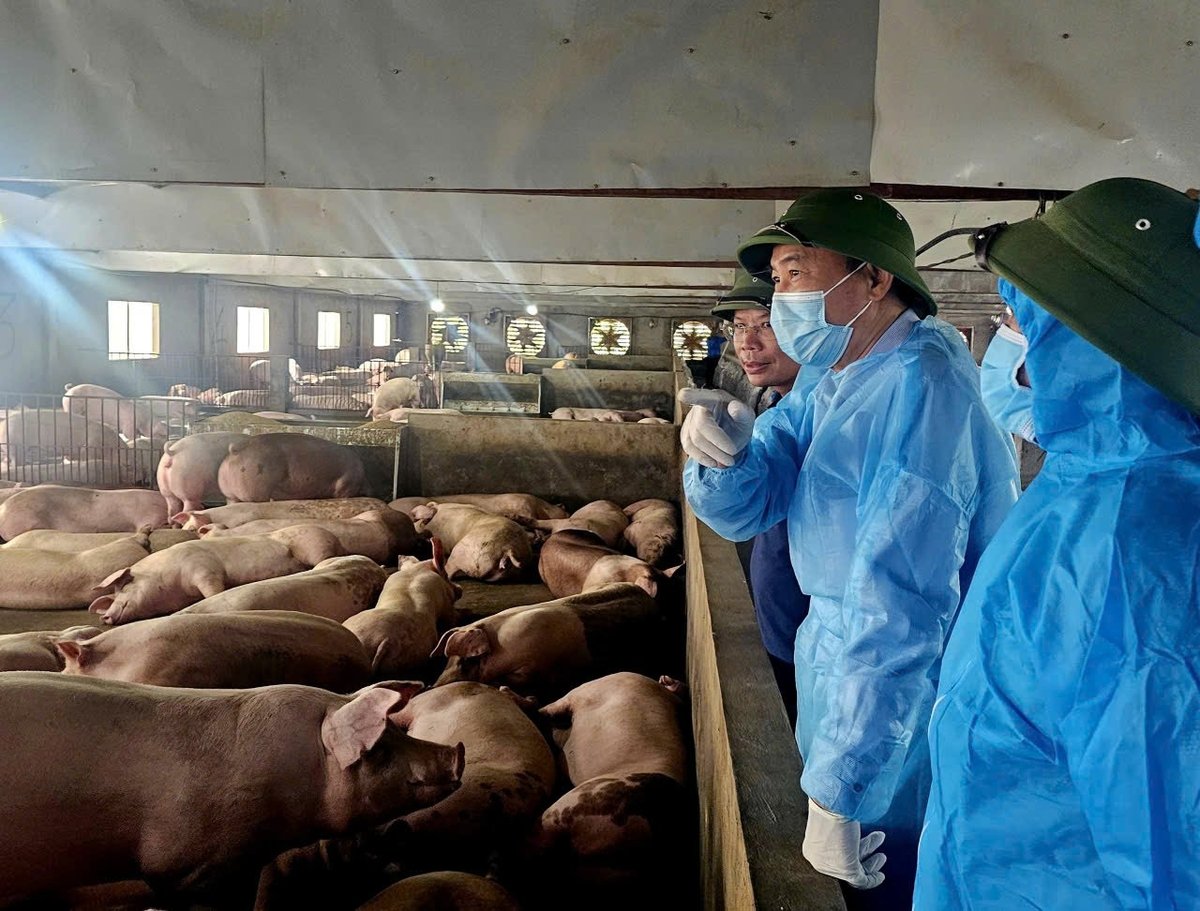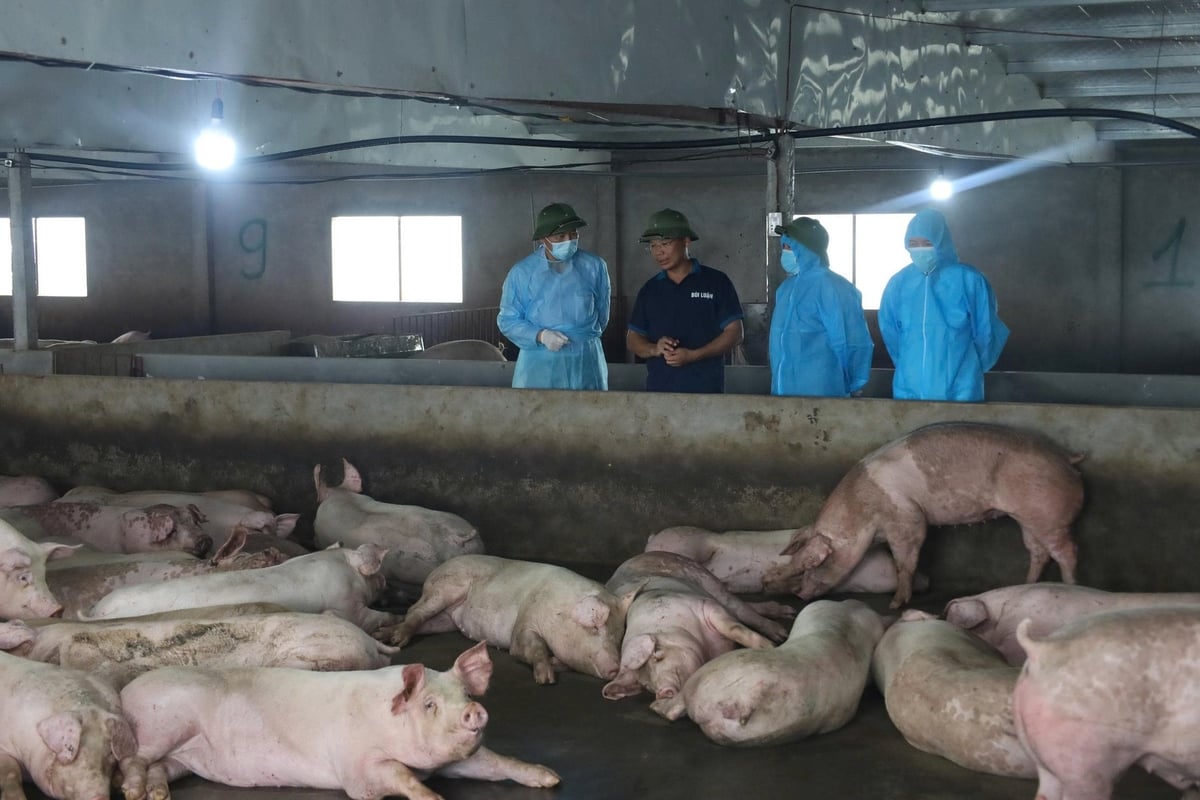December 30, 2025 | 16:43 GMT +7
December 30, 2025 | 16:43 GMT +7
Hotline: 0913.378.918
December 30, 2025 | 16:43 GMT +7
Hotline: 0913.378.918

Deputy Minister Phung Duc Tien inspects African swine fever prevention and control efforts in Phu Tho province. Photo: Bao Khang.
On August 5, Deputy Minister Phung Duc Tien led a delegation from the Ministry of Agriculture and Environment to inspect African swine fever (ASF) prevention and control efforts in Phu Tho province.
Reporting to the delegation, the Phu Tho Department of Agriculture and Environment stated that, as of August 5, the province had 108 communes and wards with ongoing outbreaks (not yet past the 21-day threshold), an increase of three communes compared to August 4. Cumulatively, ASF has occurred in 109 communes and wards, affecting over 3,800 households. More than 43,700 pigs have fallen ill, died, or been culled, with a total culled weight exceeding 2,600 tons.
To date, Phu Tho province has officially declared outbreaks in 77 communes and wards, including 36 in the former Hoa Binh area, 33 in the former Phu Tho area, and 8 in the former Vinh Phuc area.
One of the main reasons for the rapid spread of the disease, according to Phu Tho province, is the high resistance of the African swine fever virus and the emergence of a new recombinant strain, for which no effective treatment protocol currently exists. At present, 43% of tested samples have detected this new recombinant strain, and the current ASF vaccines have not shown an immune response against it. Therefore, disease prevention relies primarily on monitoring, early detection, isolation and culling, and strict application of biosecure farming practices.
Mr. Hoang Manh Thong, Director of the Provincial Sub-Department of Livestock, Animal Health and Fisheries, reported that from the beginning of 2025 to date, Phu Tho has administered approximately 60,000 doses of ASF vaccine produced by AVAC Vietnam Joint Stock Company (AVAC ASF LIVE). Of this, the provincial budget supported 4,000 doses, while the remaining 56,000 were supplied by AVAC to farmers - mainly small and medium-sized household and commercial pig farms. According to data from distributors, farmers have also purchased around 250,000 doses on their own.
However, according to Mr. Thong, vaccine hesitancy toward African swine fever still persists, as previous trials in various farms and households across Phu Tho province were unsuccessful.
“Farmers vaccinated everything, from sows, market pigs to boars. But then the market pigs died, and the sows gave birth to unhealthy piglets. People were scared. After that one bad experience, just hearing the words ‘ASF vaccine’ makes them fearful,” Mr. Hoang Manh Thong said..

Deputy Minister Phung Duc Tien directs efforts to accelerate African swine fever vaccination. Photo: Bao Khang.
Reporting to the Deputy Minister on vaccine-related issues, Mr. Nguyen Van Diep, General Director of AVAC Vietnam Joint Stock Company, stated that AVAC’s vaccine has undergone thorough evaluation and has been in development since 2021. It has already been exported to countries such as Indonesia and the Philippines. In Vietnam, major domestic companies and corporations have also adopted the use of AVAC’s ASF vaccine. Specifically, in the former Phu Tho province, AVAC has supplied around 100,000 doses over the past two years, with an additional 20,000 doses recently added due to the outbreak.
According to Mr. Diep, given that over 50% of livestock in Phu Tho is raised by small-scale farmers, vaccination remains the most effective solution. Nationwide, AVAC’s vaccine has been widely used in provinces such as Cao Bang, Lang Son, Bac Ninh, and Hai Phong. The company has directly supplied more than 900,000 doses, and over 2.06 million doses have been distributed through dealers. Reported results indicate strong protective efficacy.
“Recently, a new strain of African swine fever has emerged, and current vaccines offer limited protection and remain ineffective against it. AVAC has begun research, but it will take another one to two years before the company can deliver a safe and truly effective product,” said Mr. Diep. “Overall, public sentiment remains cautious, and it will take time and successful pilot models to build trust and scale up.”
Paying particular attention to the vaccine issue, Deputy Minister Phung Duc Tien emphasized: For small-scale household farming, ensuring biosecure practices is extremely difficult, which is why vaccination must be the core solution.
“We have to ask ourselves: if the vaccine is truly effective, why aren’t farmers getting their pigs vaccinated? With pork prices as high as they’ve been recently, it’s hard to believe that vaccine cost is the barrier. Let’s not talk about just one dose, even if it takes two or three, if we can guarantee its effectiveness, farmers will definitely get their pigs vaccinated,” Deputy Minister Phung Duc Tien stressed.
After raising the question, Deputy Minister Phung Duc Tien offered his own explanation: Could it be that people are holding onto the mindset of “once bitten, forever shy”? In reality, there have been cases where farmers vaccinated their pigs, yet the animals still died, and no one took responsibility. That’s why, alongside outreach and awareness campaigns, there must be firm commitments: “If the pigs die, I’ll take responsibility. I’ll compensate based on the weight lost.” And any provider whose vaccine results in pig deaths must be immediately suspended and have their license revoked.
“We must face this issue head-on, with honesty and accountability, if we want to build trust among farmers. I believe that if there’s a clear commitment in place, 100% of livestock farmers will be willing to vaccinate against African swine fever,” the Deputy Minister affirmed.
A Dual-solution approach
In an interview with Vuetnam Agriculture and Nature News, Deputy Minister Phung Duc Tien explained that since the beginning of the year, persistent storms, heavy rains, and flooding have created ideal conditions for the spread of African swine fever. The ASF virus is highly virulent with complex transmission routes, while vaccine coverage remains limited - key factors contributing to outbreaks in over 34 provinces and cities, resulting in the culling of more than 136,000 pigs.
“Previously, ASF was caused by genotype I strains, and we had vaccines that offered protection. However, recent surveillance has detected the circulation of genotype I-II recombinants, for which there are no existing vaccines. As a result, the mortality rate caused by this new strain exceeds 45%, with extremely high virulence and rapid fatalities,” Deputy Minister Tien assessed.
Regarding prevention and control measures as well as guidance for local authorities, Deputy Minister Phung Duc Tien affirmed that the Ministry of Agriculture and Environment has so far submitted two official telegrams to the Prime Minister, organized three thematic conferences, and dispatched 20 working groups to localities to support and direct African swine fever response efforts.
“Localities must approach disease control with the same urgency as fighting an enemy, implementing a dual-solution strategy: vaccination and biosecurity,” Deputy Minister Tien emphasized. “Grassroots officials must stay informed and closely monitor their areas to manage and report livestock accurately. Absolutely no licenses should be issued for small-scale slaughtering operations. In disease prevention, lime powder is the primary line of defense, chemicals must be readily available, and biosecurity measures, such as isolation and disinfection, must be tightly controlled from the ground up. Most importantly, the entire political system must be mobilized to ensure comprehensive and effective supervision, with strict penalties for violations to prevent the resurgence of outbreaks,” he directed.
Translated by Phuong Linh

(VAN) Located in three former provinces, Nam Dinh, Thai Binh, and Ninh Binh, and now in two provinces, Ninh Binh and Hung Yen, "Red River Delta" is the name of Vietnam's first interprovincial coastal wetland World Biosphere Reserve.
/2025/12/29/1046-1-210728_624.jpg)
(VAN) In 2025, Viet Nam recorded severe and extreme disasters, breaking multiple historical records and causing heavy losses in lives, property, and infrastructure nationwide.

(VAN) Applied technologies, water-saving irrigation is a strategic solution to promote climate-resilient agriculture and strengthen water security in the uplands.
/2025/12/29/3936-3-163422_251.jpg)
(VAN) Can Gio mangrove forest in particular and the entire Can Gio Mangrove Biosphere Reserve in general hold great potential for carbon credits.

(VAN) Chu Pah Rubber has announced its products that comply with the EU Deforestation Regulation (EUDR), affirming its commitment to sustainable production and product origin transparency.

(VAN) Deputy Director Nguyen Hoai Nam stated that a digital data platform will be developed with agricultural sector databases, utilizing AI to help farmers make informed decisions on 'watering correctly, sufficiently, and efficiently.’
/2025/12/29/4841-2-134224_777.jpg)
(VAN) From only about 10 individuals in 2009, the wild elephant population in Dong Nai has recovered to nearly 30 animals after more than 10 years.